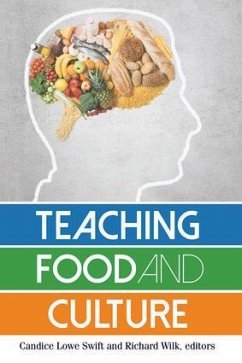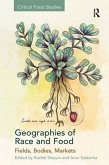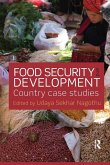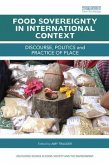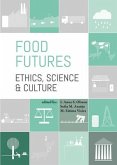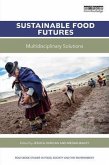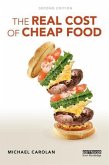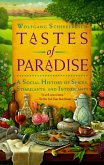Teaching Food and Culture
Herausgeber: Swift, Candice Lowe; Wilk, Richard R
Teaching Food and Culture
Herausgeber: Swift, Candice Lowe; Wilk, Richard R
- Broschiertes Buch
- Merkliste
- Auf die Merkliste
- Bewerten Bewerten
- Teilen
- Produkt teilen
- Produkterinnerung
- Produkterinnerung
A group of experienced, innovative teachers explore methods of teaching about food and using food to teach the basics of various disciplines.
Andere Kunden interessierten sich auch für
![Geographies of Race and Food Geographies of Race and Food]() Geographies of Race and Food70,99 €
Geographies of Race and Food70,99 €![Food Security and Development Food Security and Development]() Food Security and Development67,99 €
Food Security and Development67,99 €![Food Sovereignty in International Context Food Sovereignty in International Context]() Food Sovereignty in International Context60,99 €
Food Sovereignty in International Context60,99 €![Food Futures: Ethics, Science and Culture Food Futures: Ethics, Science and Culture]() Food Futures: Ethics, Science and Culture167,99 €
Food Futures: Ethics, Science and Culture167,99 €![Sustainable Food Futures Sustainable Food Futures]() Sustainable Food Futures60,99 €
Sustainable Food Futures60,99 €![The Real Cost of Cheap Food The Real Cost of Cheap Food]() Michael CarolanThe Real Cost of Cheap Food55,99 €
Michael CarolanThe Real Cost of Cheap Food55,99 €![Tastes of Paradise Tastes of Paradise]() Wolfgang SchivelbuschTastes of Paradise14,99 €
Wolfgang SchivelbuschTastes of Paradise14,99 €-
-
-
A group of experienced, innovative teachers explore methods of teaching about food and using food to teach the basics of various disciplines.
Hinweis: Dieser Artikel kann nur an eine deutsche Lieferadresse ausgeliefert werden.
Hinweis: Dieser Artikel kann nur an eine deutsche Lieferadresse ausgeliefert werden.
Produktdetails
- Produktdetails
- Verlag: Taylor & Francis
- Seitenzahl: 213
- Erscheinungstermin: 30. Juni 2015
- Englisch
- Abmessung: 231mm x 156mm x 14mm
- Gewicht: 343g
- ISBN-13: 9781629581279
- ISBN-10: 1629581275
- Artikelnr.: 41793139
- Herstellerkennzeichnung
- Libri GmbH
- Europaallee 1
- 36244 Bad Hersfeld
- gpsr@libri.de
- Verlag: Taylor & Francis
- Seitenzahl: 213
- Erscheinungstermin: 30. Juni 2015
- Englisch
- Abmessung: 231mm x 156mm x 14mm
- Gewicht: 343g
- ISBN-13: 9781629581279
- ISBN-10: 1629581275
- Artikelnr.: 41793139
- Herstellerkennzeichnung
- Libri GmbH
- Europaallee 1
- 36244 Bad Hersfeld
- gpsr@libri.de
Candice L. Swift is Associate Professor in the Department of Anthropology at Vassar College and a founding director of the college's Multidisciplinary Learning-Living Community on Food. She has studied Russian language, history, and culture in the former Soviet Union, conducted research on nationalism in post-Soviet Central Asia, and currently focuses on cultural citizenship and diasporic identification on the Indian Ocean Island of Mauritius. She has been teaching courses on food, culture, and sustainability for several years, and has initiated a number of service-based learning opportunities around issues related to food. Richard Wilk is Provost's Professor of Anthropology at Indiana University where he directs the Food Studies Program. His most recent edited books are Time, Consumption, and Everyday Life (with Elizabeth Shove and Frank Trentmann, Berg Publishers, 2009), and Rice and Beans: A Unique Dish in a Hundred Places (with Livia Barbosa, Berg, 2011). He has been teaching courses on food and culture and food, sex and gender for more than a decade.
Part 1: Teaching Food Chapter 1: Introduction: Teaching With and Through Food
Candice Lowe Swift and Richard Wilk Chapter 2: Interview with Sidney Mintz
Candice Lowe Swift and Richard Wilk Part 2: Nutrition and Health Chapter 3: Teaching Obesity: Stigma
Structure
and Self
Alexandra Brewis
Amber Wutich and Deborah Williams Chapter 4: Are We What Our Ancestors Ate? Introducing Students to the Evolution of Human Diet
Jeanne Sept Chapter 5: Just Milk? Nutritional Anthropology and the Single Food Approach
Andrea S. Wiley Part 3: Food Ethics and the Public Chapter 6: Teaching the Experience and Ethics of Consumption and Food Supply
Peter Benson Chapter 7: Ethnography of Farmers Markets: Studying Culture
Place
and Food Democracy
Carole Counihan Chapter 8: Using Volunteer Service in Courses about Food
Janet Chrzan Part 4: Food
Identity
and Consumer Society Chapter 9: Teaching Restaurants
David Sutton and David Beriss Chapter 10: Developing Pedagogies for the Anthropology of Food
Brian Stross Chapter 11: Teaching Communication and Language with Food
Amber O'Connor Chapter 12: The Last Course: Relating Research to Teaching about Food
Penny van Esterik
Candice Lowe Swift and Richard Wilk Chapter 2: Interview with Sidney Mintz
Candice Lowe Swift and Richard Wilk Part 2: Nutrition and Health Chapter 3: Teaching Obesity: Stigma
Structure
and Self
Alexandra Brewis
Amber Wutich and Deborah Williams Chapter 4: Are We What Our Ancestors Ate? Introducing Students to the Evolution of Human Diet
Jeanne Sept Chapter 5: Just Milk? Nutritional Anthropology and the Single Food Approach
Andrea S. Wiley Part 3: Food Ethics and the Public Chapter 6: Teaching the Experience and Ethics of Consumption and Food Supply
Peter Benson Chapter 7: Ethnography of Farmers Markets: Studying Culture
Place
and Food Democracy
Carole Counihan Chapter 8: Using Volunteer Service in Courses about Food
Janet Chrzan Part 4: Food
Identity
and Consumer Society Chapter 9: Teaching Restaurants
David Sutton and David Beriss Chapter 10: Developing Pedagogies for the Anthropology of Food
Brian Stross Chapter 11: Teaching Communication and Language with Food
Amber O'Connor Chapter 12: The Last Course: Relating Research to Teaching about Food
Penny van Esterik
Part 1: Teaching Food Chapter 1: Introduction: Teaching With and Through Food
Candice Lowe Swift and Richard Wilk Chapter 2: Interview with Sidney Mintz
Candice Lowe Swift and Richard Wilk Part 2: Nutrition and Health Chapter 3: Teaching Obesity: Stigma
Structure
and Self
Alexandra Brewis
Amber Wutich and Deborah Williams Chapter 4: Are We What Our Ancestors Ate? Introducing Students to the Evolution of Human Diet
Jeanne Sept Chapter 5: Just Milk? Nutritional Anthropology and the Single Food Approach
Andrea S. Wiley Part 3: Food Ethics and the Public Chapter 6: Teaching the Experience and Ethics of Consumption and Food Supply
Peter Benson Chapter 7: Ethnography of Farmers Markets: Studying Culture
Place
and Food Democracy
Carole Counihan Chapter 8: Using Volunteer Service in Courses about Food
Janet Chrzan Part 4: Food
Identity
and Consumer Society Chapter 9: Teaching Restaurants
David Sutton and David Beriss Chapter 10: Developing Pedagogies for the Anthropology of Food
Brian Stross Chapter 11: Teaching Communication and Language with Food
Amber O'Connor Chapter 12: The Last Course: Relating Research to Teaching about Food
Penny van Esterik
Candice Lowe Swift and Richard Wilk Chapter 2: Interview with Sidney Mintz
Candice Lowe Swift and Richard Wilk Part 2: Nutrition and Health Chapter 3: Teaching Obesity: Stigma
Structure
and Self
Alexandra Brewis
Amber Wutich and Deborah Williams Chapter 4: Are We What Our Ancestors Ate? Introducing Students to the Evolution of Human Diet
Jeanne Sept Chapter 5: Just Milk? Nutritional Anthropology and the Single Food Approach
Andrea S. Wiley Part 3: Food Ethics and the Public Chapter 6: Teaching the Experience and Ethics of Consumption and Food Supply
Peter Benson Chapter 7: Ethnography of Farmers Markets: Studying Culture
Place
and Food Democracy
Carole Counihan Chapter 8: Using Volunteer Service in Courses about Food
Janet Chrzan Part 4: Food
Identity
and Consumer Society Chapter 9: Teaching Restaurants
David Sutton and David Beriss Chapter 10: Developing Pedagogies for the Anthropology of Food
Brian Stross Chapter 11: Teaching Communication and Language with Food
Amber O'Connor Chapter 12: The Last Course: Relating Research to Teaching about Food
Penny van Esterik

